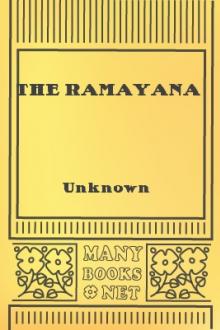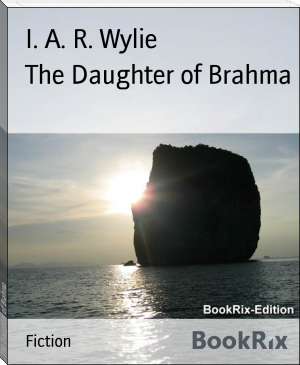The Ramayana - Valmiki (best ereader for epub txt) 📗

- Author: Valmiki
- Performer: -
Book online «The Ramayana - Valmiki (best ereader for epub txt) 📗». Author Valmiki
“This is a favorite subject of Hindú sculpture, especially on the temples of Shiva, such as the caves of Elephanta and Ellora. It, no doubt, is an allegory of the contest between the followers of Shiva and the worshippers of the Elements, who observed the old ritual of the Vedas; in which the name of Shiva is never mentioned.
[pg 543]Indian Ballads and other Poems.
“The personification of Urvasî herself is as thin as that of Eôs or Selênê. Her name is often found in the Veda as a mere name for the morning, and in the plural number it is used to denote the dawns which passing over men bring them to old age and death. Urvasî is the bright flush of light overspreading the heaven before the sun rises, and is but another form of the many mythical beings of Greek mythology whose names take us back to the same idea or the same root. As the dawn in the Vedic hymns is called Urûkî, the far-going (Têlephassa, Têlephos), so is she also Uruasî, the wide-existing or wide-spreading; as are Eurôpê, Euryanassa, Euryphassa, and many more of the sisters of Athênê and Aphroditê. As such she is the mother of Vasishtha, the bright being, as Oidipous is the son of Iokastê; and although Vasishtha, like Oidipous, has become a mortal bard or sage, he is still the son of Mitra and Varuṇa, of night and day. Her lover Purûravas is the counterpart of the Hellenic Polydeukês; but the continuance of her union with him depends on the condition that she never sees him unclothed. But the Gandharvas, impatient of her long sojourn among mortal men resolved to bring her back to their bright home; and Purûravas is thus led unwitingly to disregard her warning. A ewe with two lambs was tied to her couch, and the Gandharvas stole one of them; Urvasî said, ‘They take away my darling, as if I lived in a land where there is no hero and no man.’ They stole the second, and she upbraided her husband again. Then Purûravas looked and said, ‘How can that be a land without heroes or men where I am?’ And naked he sprang up; he thought it was too long to put on his dress. Then the Gandharvas sent a flash of lighting, and Urvasî saw her husband naked as by daylight. Then she vanished. ‘I come back,’ she said, and went. ‘Then he bewailed his vanished love in bitter grief.’ Her promise to return was fulfilled, but for a moment only, at the Lotos-lake, and Purûravas in vain beseeches her to tarry longer. ‘What shall I do with thy [pg 545] speech?’ is the answer of Urvasî. ‘I am gone like the first of the dawns. Purûravas, go home again. I am hard to be caught like the winds.’ Her lover is in utter despair; but when he lies down to die, the heart of Urvasî was melted, and she bids him come to her on the last night of the year. On that night only he might be with her; but a son should be born to him. On that day he went up to the golden seats, and there Urvasî told him that the Gandharvas would grant him one wish, and that he must make his choice. ‘Choose thou for me,’ he said: and she answered, ‘Say to them, Let me be one of you.’ ”
Cox's Mythology of the Aryan Nations. Vol. I. p. 397.
“Vánar is one of the most frequently occurring names by which the poem calls the monkeys of Ráma's army. Among the two or three derivations of which the word Vánar is susceptible, one is that which deduces it from vana which signifies a





Comments (0)